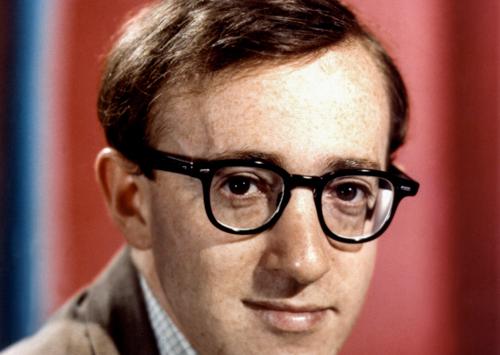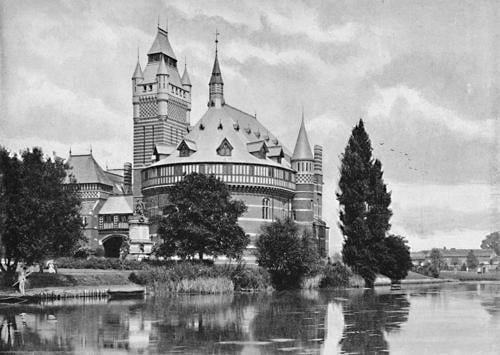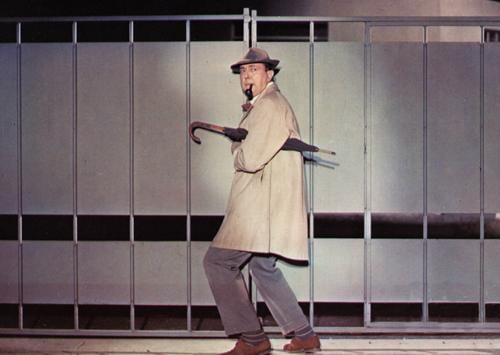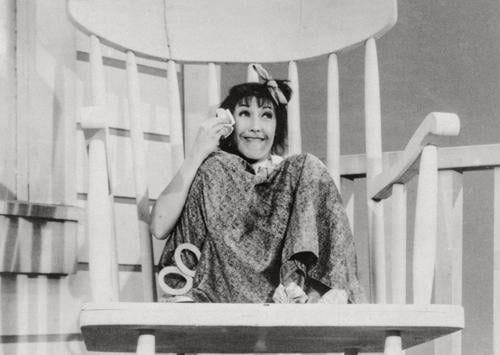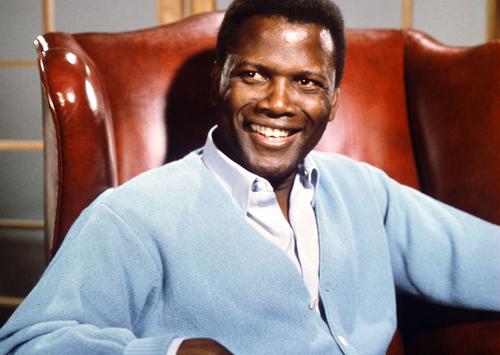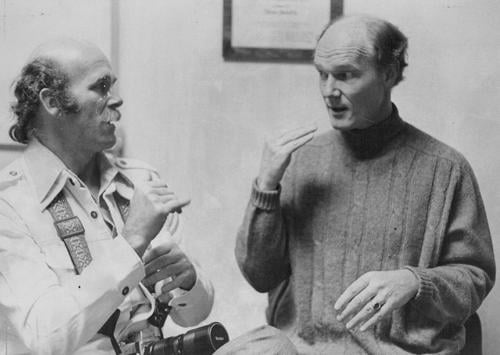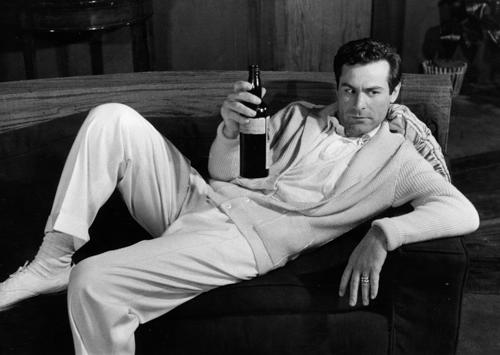Listen to New Voices on Studs Terkel our partnership with 826CHI-here! Read the Story
Showing 1 - 15 of 82 results
-
Woody Allen discusses his work as a comedic writer and performer
Jun. 1, 1965 Woody Allen discusses his life and art, the influence of both success and failure on his work, and how he finds comedy in life’s difficulties and trials. He discusses his first screenplay, “What’s Up Pussycat?” and other comedians who have influenced the development of his own comedic work, including Mort Sahl, Charlie Chaplin, the Marx Brothers, and George S. Kaufman.
-
Vincent Dowling discusses his career in theater
Mar. 1, 1990 Actor, director, and author Vincent Dowling performs scenes and roles from his repertoire. He discusses his previous plays and touches on what influenced his career in acting and directing.
-
Terkel discusses the opera and theater.
Sep. 28, 1989 Promoting a production of "The Zoo: A Musical Folly," with the Gilbert and Sullivan Society of Chicago's Executive Producer Gretchen Potts and Artistic Director Carl Forsberg.
-
Studs Terkel in Stratford-Upon-Avon. At the National Theatre and at the Falcon Hotel ; part 1
1962 Studs Terkel heads to the British town of Stratford-upon-Avon (the birthplace of William Shakespeare) intending to interview Sir John Gielgud, and getting a few words before Studs realizes that Sir John is not intending to be interviewed. He speaks instead to other members of the company. Then he meets Mr. and Mrs. Lawrence in the Falcon Hotel.
-
Studs Terkel discusses the global status of theater with Croatian director Vlado Habunek
Apr. 25, 1962 Vlado Habunek, the Director of The Croatian National Theater, also a teacher at the University of Zagreb and board member for the Debrovnik Summer Festival discusses how all arts are seeking new revelations with Studs Terkel. Terkel asks Habunek to compare American Actors with Croatian actors because they are subsidized by the state. He sees Croatian actors as too secure and admires the ambition of American actors. The fact that theater reflects life and life is difficult begins a discussion on the status of theater today.
-
Studs Terkel discusses the film "Mon Oncle"with creator Jacques Tati
Dec. 12, 1958 Studs Terkel reintroduces this 1958 broadcast with Jacques Tati in a 1992 rebroadcast. At 39:06, Terkel includes a musical epilogue to the conversation with Jacques Tati with French children's songs such as "Cadet Rousselle". Tati discusses his films "Mr. Hulot's Holiday" and" Mon Oncle" and his emphasis as writer, director, actor, and producer to maintain a naturalness. He doesn't want lights, cameras or action to influence the actors. Naturalness will respect independence and keeping it simple and real will create pride and invite people in.
-
Studs Terkel discusses the character of Edith Ann with creators Lily Tomlin and Jane Wagner
Oct. 20, 1994 The comedic creative force of Lily Tomlin and Tomlin's comedy writer Jane Wagner discuss the character of Edith Ann as well as the bag lady, Trudy. The comic geniuses discuss with Studs Terkel the new release "Edith Ann: My Life So Far". Tomlin assumes the character of Edith Ann to relay stories of her life in a dysfunctional family as a six year old. Edith Ann writes letters to Rush Limbaugh, Howard Stern, and Senate representatives to get her message heard. She tells the Senator that kids model grownups and grownups need to act better to protect the kids.
-
Sir Cedric Hardwicke discusses today's theatre
Oct. 14, 1960 According to Sir Cedric Hardwicke, plays are only fashionable in New York City even though people all around the country are hungry to see a good play. In England around Christmas time, Hardwicke says children are exposed to plays at an early age, unlike here in the states, where there aren't any plays geared toward children.
-
Sidney Poitier discusses his book "This Life"
Jun. 13, 1980 Actor and director Sidney Poitier offers his reflections about his autobiographical memoir, "This Life". Poitier explains how he never had ambitions to be an actor and yet he stumbled into acting when looking through the clasisfied ads. There's a story about his agent trying to settle a negotiation on Poitier's behalf. Poitier's agent told the others involved that Poitier was offered a film in Hollywood. Believing it was a cheap ploy, the agent was told to tell Poitier to go onto Hollywood, and the rest is history for Sidney Poitier.
-
Shelley Berman reads from and discusses his role in "The Value of Names"
Apr. 4, 1983 In the play, "The Value of Names," Shelley Berman plays Benny Silverman, a role which he says is him, an actor from the Hollywood black list. Berman said being in Chicago, acting the role and working with the cast has been THE best experience of his life and when the show closes, it will be the saddest day of his life. The director of the play, Sandy Shinner, said she knew of the Hollywood black list but didn't know about all the personal stories. There is an excerpt of Vic Navasky.
-
Several members of the cast of The Theater for the Deaf discuss their production ; Couples with a brief interview with John Cage and "Music for Carillon" is played.
Apr. 23, 1968 Rilla Bergman, Lou Fant, and Bill Reese converse with Studs about The National Theater for the Deaf and the production they are presenting. Two of the actors Ms. Bergman and Mr. Reese discuss what it took to learn, as hearing people, the best ways to express themselves with sign language. They all talk about how much more expressive the actors in the Deaf Theater have to be to convey the message of the piece they are presenting.
-
Sam Wanamaker discusses the theater ; part 1
Dec. 4, 1964 Sam Wanamaker talks about the curtain of a stage being a barrier between the set and the audience. Wanaker says that with theater today, there are more theaters in the round and more thrusts of ramps built into the audience, so that the audience can feel they are a part of the production of the play.
-
Roy Dotrice and Patrick Garland discuss the play "Brief Lives"
Sep. 25, 1970 Patrick Garland directs Roy Dotrice, who plays the old and lonely John Aubrey in "Brief Lives". While in studio, Dotrice reenacts part of the one-man show. Garland explains that the play is about John Aubrey, on the last day of his life, telling the audience about the past lives he's encountered.
-
Roscoe Lee Browne, Derek Walcott and Gregory Mosher discuss the play "Pantomime"
Principal actor Roscoe Lee Browne, playwright Derek Walcott, and director Gregory Mosher discuss the play "Pantomime" and it's major themes of racial role reversal, Robinson Crusoe influences, and colonialism.
-
Ray Gordon and Susanne Nussbaum discuss the play "Disabled Genius" and people with disabilities
Nov. 27, 1979 Ray Gordon, writer and director, and Susanne Nussbaum, cast member of "Disabled Geniuses," discuss the play and the life of people with disabilities. Nussbaum recalls experiences of discrimination she and her friends have faced due to their differences. Both interviewees then talk about the members of the play and some of the characters involved.


